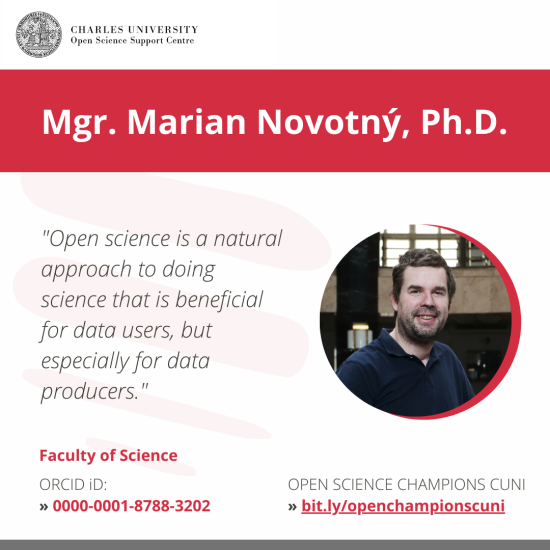 Department of Cell Biology
Department of Cell Biology
Faculty of Science
ORCID: 0000-0001-8788-3202
ResearcherID: B-7036-2008
Twitter: @majek_n
I was very fortunate to get into Gerard Kleywegt’s laboratory at Uppsala University for my doctorate, which sought to promote the principle in the community of structural biologists that 3D structures of macromolecules should be published along with experimental data. Gerard also developed tools for validating experimental data from X-ray crystallography. Practically from the beginning of my scientific career, I considered the availability of data to be a basic prerequisite for scientific projects. I am still working in the field of structural bioinformatics, which is dependent on open data and, thanks to the availability of data, has resulted in a number of valuable findings applicable in biomedicine and in the development of diagnostic or therapeutic methods. At Charles University, I participate in the development of the large pan-European infrastructure ELIXIR. The European ELIXIR has national hubs, and the Czech hub ELIXIR CZ is an infrastructure that strives for the integrated provision (collection, storage, organization, and analysis) of “life science” data based on FAIR principles.
In our research group CUSBG, which we manage with David Hoksza from the Faculty of Mathematics and Physics, Charles University, we put software (and used datasets) to GITHUB so that they are publicly available. Within the ELIXIR CZ infrastructure, we organize training on FAIR principles, open data, and tools for their management – especially relating to the Data Stewardship Wizard tool, which is being developed by a colleague from the Czech Technical University, Robert Pergl.
The openness of scientific data is extremely valuable because it not only allows us to acquire scientific knowledge faster, but the current pandemic situation shows us that open science allows us to concentrate vast amounts of data (more than a million fully sequenced SARS-COV2 genomes are available) that can be used to acquire non-trivial insights into virus biology, but also as training material for dynamically evolving machine learning methods. Last but not least, open science allows virtually anyone with Internet access to “do science”. It is a really inspiring experience to see high school students search human protein databases and try to understand how specific mutations can cause serious disease. Open science thus helps promote the scientific careers of many students who would not otherwise have the opportunity to acquire direct experience with scientific work.
Contact colleagues who have experience with this – if they work in the field of life science, we will be happy to help in ELIXIR CZ. The Open Science Support Centre is the right place to look for help at Charles University.
In my opinion, obstacles occur on several levels. Of course, one must have hardware and software resources and a network infrastructure that allow data to be shared reliably and securely. It is also necessary to have data sharing protocols and provide training that will make it easier for users to share data, and first and foremost, scientists must be motivated to share data with positive examples.
Open science is a natural approach to doing science that is beneficial for data users, but especially for data producers.

Residency, Invoicing and Correspondence Address
Charles University
Central Library
Ovocný trh 560/5
116 36 Prague 1
Czech Republic
Office Address
José Martího 2 (2nd floor)
160 00 Prague 6
Phone: +420 224 491 839, 172
E-mail: openscience@cuni.cz
Www: openscience.cuni.cz